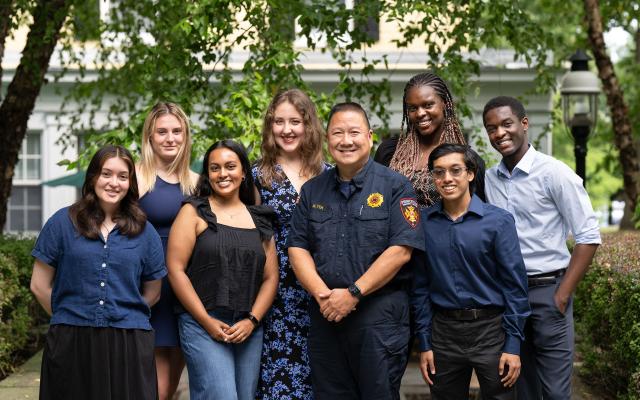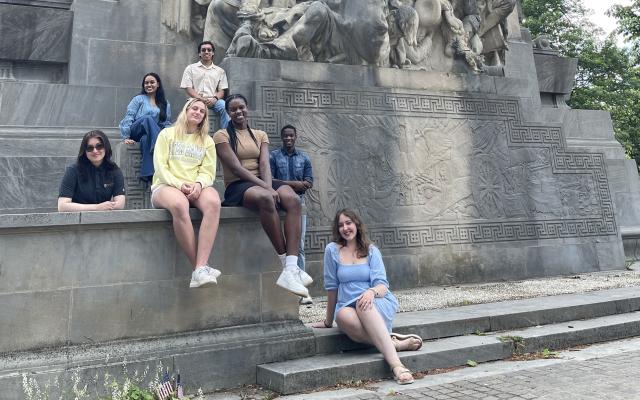

A summer of discovery, design, and community-powered impact
Design for Real-World Impact: Work with real people to create real change!
Tiger Challenge is a nine-week, full-time summer design program where Princeton students immerse themselves in complex, community-rooted challenges and learn how to approach change collaboratively with the people who live those experiences every day.
At Keller, design means starting with people, listening deeply, understanding context, and co-creating ideas that reflect real needs and aspirations. It’s a process grounded in curiosity, empathy, and creativity, not quick fixes.
In Summer 2026, we’ll collaborate with the Smith Family Foundation in Trenton on the revitalization of Heritage Square, a historic block being reimagined as a cultural, educational, and community hub. Together, we’ll explore how design can foster belonging, honor local stories, and uplift visions shaped by residents and community partners.
This is design that asks you to listen deeply, challenge assumptions, and prototype with humility and creativity.
What is Tiger Challenge?
Tiger Challenge is not a lecture, a simulation, or a hypothetical exercise. It's an immersive, unpredictable, and ever-evolving design program centered on collaborative interventions.
Design at Keller isn’t about quick fixes or aesthetics—it’s about people. We use design as a way to understand complex challenges and co-create solutions with those most affected. It starts with listening, builds on empathy, and moves forward through creativity and collaboration.
Through Tiger Challenge, you’ll help shape change in communities and, in the process, transform your own perspective, developing tools for empathy, leadership, and design that last far beyond the summer.
What you'll do and what you'll gain
- Connect with the community: Spend time in the field building relationships with residents, entrepreneurs, and local leaders
- Practice ethnographic research: Use interviews, observations, and analysis to uncover insights and context
- See the bigger picture: Map systems and surface tensions, and identify meaningful opportunities for change
- Bring ideas to life: Build and test prototypes that respond to real community insights
- Honor the past, imagine the future: Craft concepts that respect history while exploring new possibilities
- Share your work: Present your ideas in a final showcase to partners and campus audiences
Along the way, you’ll also:
- Learn humanistic design through real community-engaged work
- Build confidence in navigating open-ended, ambiguous challenges
- Gain practical experience that strengthens applications for internships, jobs, and graduate programs
- Join a supportive cohort that values creativity, community engagement, and social mission
- Work closely with faculty advisors and design practitioners
- Leave with a portfolio-ready story that reflects real-world experience and impact
Benefits
- Build a network of established community partners, dedicated Princeton advisors, innovators, designers, and consultants
- Attended customized workshops and lectures created specifically for Tiger Challenge participants
- Receive a $5,000 stipend
- Receive campus housing and a meal plan for the duration of the program
- Your participation counts toward the Entrepreneurship Minor practicum
- Present your work at a public end-of-summer showcase for community stakeholders, Princeton faculty, and campus leadership
- Invitation to participate in Princeton Research Day
Eligibility
- Open to currently enrolled undergraduate and graduate students (Graduate students must provide written approval from their faculty advisor.)
- All majors and levels of experience are welcome
- I-9 is not required
Applications for Tiger Challenge are now closed. Be notified when the application period opens next.
2024 Social Impact Showcase

The seven-person cohort of impact designers presented their recommendations to the municipality, community stakeholders, and campus partners at the Tiger Challenge Social Impact Showcase.
The Tiger Challenge program members spoke with residents, gathered data, analyzed research, and built prototypes that can significantly impact the population.
Community-minded undergraduates worked with the Princeton Municipality and the Office of Emergency Management (OEM) to design interventions to bridge the gap between the municipality and the Princeton community.



